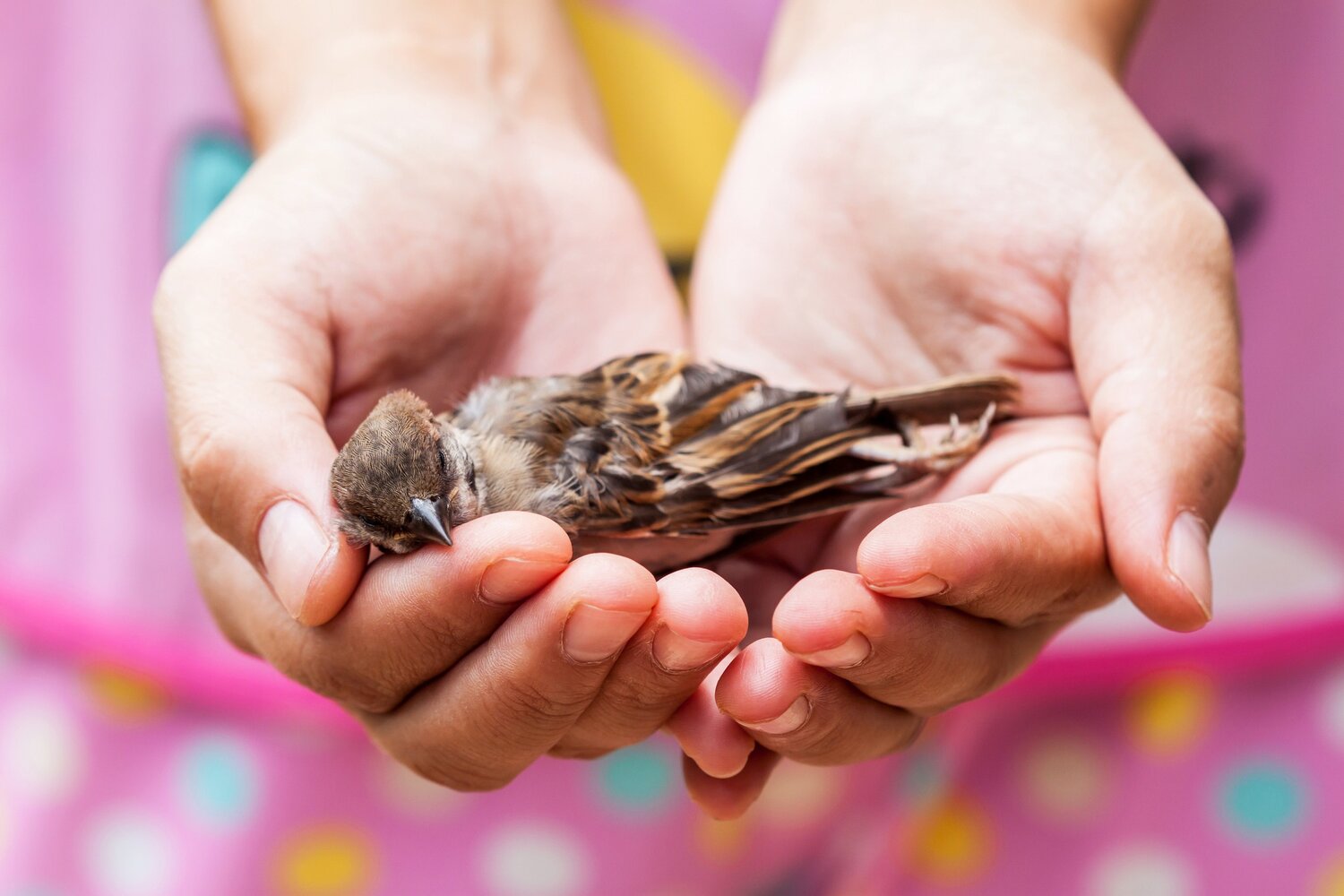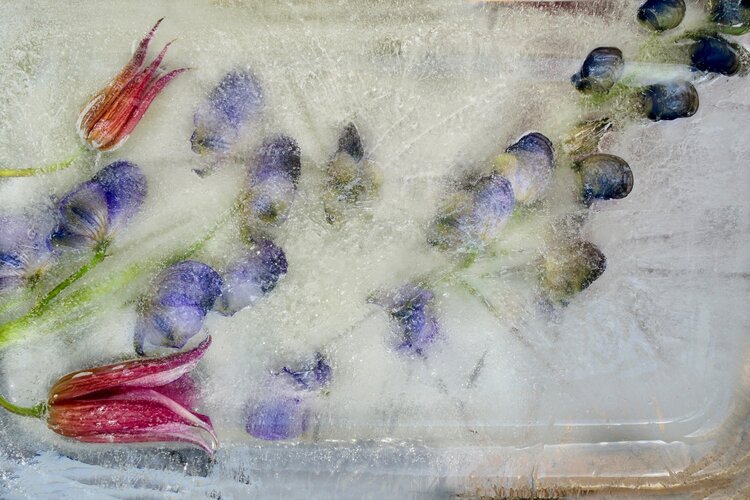In every waking millisecond, we sit on the cusp of delight and apprehension

In our daily lives, we often do not know when a moment morphs from creation to cessation. Beginnings command our attention, proclaiming themselves with confetti and sparks: babies are born, we fall in love and build houses. While dancing in our kitchen, we throw caution to the wind, getting drunk on dreams and hope. Equally apparent are finalities, though they declare themselves more somberly: loved ones die, relationships end, and our children inevitably grow up.
In between memorable instances is the stuff of life — moments that make memories, which in turn compost into time and pave the way for the new. It’s in the realm of folding laundry, checking texts, and sitting in traffic that we dwell — not knowing in time, what each interaction and minuscule detail will stand out as, or if it will stand out at all.
I remember one autumn, walking in a meadow with my aging father. He was struggling with worsening heart failure, and his grey eyes and softened coloring seemed to coalesce into the landscape that surrounded us. This man, whose back I rode in tidal pools — who took me bushwhacking, owling and fishing for trout — could no longer cross a stream without taking my hand. In that moment, unbeknownst to me, slept the seeds of an ending, and I now realize that this was to be the last time we’d walk on wild ground together.
Often, only in hindsight do we comprehend that we have crossed such thresholds: moments when endings occur, and we are nescient. Though if we are lucky, we can still recall the last kiss or time we perched our child (now too heavy) on our hip. But, more likely, we will not remember these junctures. How could we? Nescience, defined as the absence of knowing, is more accurately associated with innocence, and less so with ignorance.
That we don’t recognize most endings when they happen is simultaneously tragic, merciful, and perhaps most poignant, profoundly human.
Is there a realm in between? Where the unconscious and the conscious intermingle — affording us daily opportunities to wake to our child’s musings, our mundane chores, and the silenced stirrings of our heart?
Social scientist and bestselling author Brené Brown speaks to foreboding joy (FBJ): windows of beauty and awe so painfully tender and lovely that in the space of a millisecond, we unconsciously flash to terror and shut them down. It seems our minds are prone to transposing the ghosts of catastrophe onto our sleeping children, most intimate loves, and occasions of good fortune.
FBJ, an instinctual recoiling from delight, is one of the most insidious defenses against vulnerability and is inherently embedded in being mortal. When (or if) we have a history of trauma, we may live for years unknowingly haunted by it, and, if left unchecked, it has the potential to shut down love and connection, two of the bedrocks of a wholehearted life.
Recently, while writing the article: John Gottman and Brene Brown on Running Headlong Into Heartbreak, a thought occurred to me that was so heartrending and breathtaking, it warranted an essay of its own:
Foreboding joy is Negative Sentiment Override to life.
Negative Sentiment Override (NSO), a term coined by John Gottman, speaks to the tendency toward viewing our partner and the history of our relationship through a darkened lens. It is a symptom as much as a state. Characterized by a loss of hope, our memories, once imbued with fondness, get recast in our mind’s eye and become concealed by gloom.
NSO is, in essence, a cumulative byproduct of missed opportunities for connection: sliding door moments, where we turn away (and against) junctures that necessitated our care and presence — we neglect to ask about the biopsy, forget to say we’ll be late, or dismiss the melancholy expression on our partner’s face — again and again.
What if every moment in life is a sliding door moment, and in turn, gifts us with opportunities to love or wither?
A child in utero will move towards its mother’s voice as surely as any day lily seeks out the sun. An infant’s heartbeat will synchronize to the rhythm of its primary caregiver by ticking in solidarity to the universal cadence of life: the crickets chirping, raindrops pattering and the rocking of the tide. We come into this world, turning toward — to love and to be loved. It is our birthright.
But what happens if, from the very beginning, life slaps us down and turns us away, meeting us with desynchronization or silence? If instead of a soft caress or a friendly smile, we encounter neglect, abuse, rejection, or ridicule by those we are wired to trust? What happens if we experience such assaults globally, as a result of factors beyond our control, such as our race, ethnicity, class, gender, or sexual orientation? The implications are staggering.
With each loss, we experience a growing intolerance to risk, and in turn, a subconscious aversion to joy. According to Brown, trauma’s greatest casualty is vulnerability. When we’re no longer able to discern what is safe, good, and life-giving, our compass is uncalibrated. So (understandably), we lose trust in life, dress-rehearse tragedy, and recoil or come out swinging.
Turning away from love is the hallmark of anguish. Our psyches and souls start to hurt when a growing sense of urgency complicates the ageless crucibles of mortality and transience. Have we reached a pinnacle where the cumulative legacy of humanity: intergenerational trauma, patriarchy, racism, genocide and negligent stewarding of our planet is compelling even the sanest among us to dive-bomb into the abyss by swallowing fistfuls of blue pills and disowning our vulnerability in turn?
In every waking millisecond, we sit on the cusp of delight and apprehension, informed by an infinite number of variables. What FBJ and NSO share in common, is a turning away from the potential of love, life and vulnerability — sometimes knowingly and sometimes not. In the belly of the whale lies loss and our relationship to it.
Over the summer, a momma fox and her two gangly adolescents took out every backyard chicken within five miles of our rural home. My daughter and I were standing at the door of a white transport van, in a Cumberland Farms parking lot, when the universe delivered a jumping bean of a rescue puppy into our arms and promptly scooped up seven chickens in exchange. We came home to silence and feathers.
A week later we brought home four new pullets, including a sweet black Australorp that honked instead of clucked. My daughter named her Midnight. We locked them safely away in the run. Several days later, while feeding the hens, I turned to the buzzing of flies and saw the starless shape of Midnight slumped lifeless on the stoop. Despite our diligence, we had lost another bird unexplainably, and I struggled with how to tell my child.
We cannot escape certain realities in life. The fox lives in the hen. What are we to do?
The Imperative to Delight
If joy is a portal to terror, it is simultaneously a gateway to delight — each shimmering moment invites us to embrace the paradox of our mortality. We awaken to myriad experiences: what is bitter may become sweet, what is sorrowful may become luminous. Delight, at its best, is the embodiment of gratitude, and I would argue that we are obliged to revel while together we weep — that in acknowledging we are ephemeral, there lies the potential for a sorely needed tenderness amongst humanity.
As poet Ross Gay so beautifully ponders in his essay: Joy Is Such a Human Madness, “What if we joined our sorrows — what if that is joy?” Such communing requires a willingness, courage, and most importantly, vulnerability. But, we can (and must) turn towards sorrow as surely as we turn towards delight — they are sisters and to embody both is grace at its finest.

Gay also takes it a step further, discerning between pleasure and delight. With pleasure being readily accessible and playing to our senses. Sitting with my ten-year-old over breakfast, sharing steamy black vanilla tea and a platter of smokey bacon and maple-cream frosted toast is a pleasure. It’s the first day of fifth grade. Looking at her face, her eyes the same river blue-green they were as a baby; the angle of her nose, familiar — yet not. Time bends, and I swell with tears and laughter — delight.
Sitting at the threshold of joy is both terrifying and magnificent. Angst is an understandable outgrowth. But when we reside here chronically and unknowingly, it is likely due to a multitude of injuries incurred over time. Trauma has crawled into our beds and slipped a worm inside our ear; it burrows deeply into our hearts and whispers that we are not lovable — the reclaiming of delight, and our worthiness of it, is therefore not a luxury but an imperative.
The Capacity for Awe
We must find a portkey — that magical touch-down object Harry Potter reaches for when circumstances necessitate that he transport himself from here to there — a portal to awe that is readily accessible and simultaneously grand: the first two verses of Cohen’s Hallelujah, a glint of light, a lush peony. Each of these can be gateways to joy because awe is non-discriminate.
By nurturing our capacity for wonderment, we nurture fondness and admiration for life. It’s a powerful antidote to negativism and hopelessness, flies smack in the face of nihilism, and is a courageous stance in response to hurt and fear. Furthermore, since awe does not require a shared theology, it is transcendent and is a balm that treats all wounds in a world where there are many.
As a couples therapist, I’ve witnessed my share of marriages ending. Having sat with partners whose love is metamorphosing or dying, I’ve observed the terror on people’s faces, heard the shouting and seen the tears that come from the inevitability of change. I’ve been struck by the palpable beauty and tenderness that can arise in the seemingly darkest of moments — a wife reaching for her husband’s hand while simultaneously weeping and saying goodbye.

Finding beauty and risking vulnerability through joy, is a monumental feat when in NSO to life. What awe is fantastically good at is taking that which rattles us, and instead calms, dazzles or assures us, thus morphing the full catastrophe of living into shimmering stardust. Even amidst suffering, life affords us ample opportunities to pause and take in the beauty, and when we can let our perspectives soften, things like our time-worn hands or the death of a relationship offer up potential in cultivating a gentleness.
I spent years eluding heartache, and in turn, the totality of joy. Despite my proclivity for sad memoirs and murder ballads, I did my best to keep loss at bay and maximize pleasure. On numerous occasions, I grasped when I should have let go, and with the steadfastness of Icarus, I burst into flames, then ash, then water. Loss has given me the gift of perspective and age (ironically) time. Grief is merciful that way.
When I was a child, my father kept honeybees. He’d lull them to sleep with smoke while we plundered their hives. In the space of an hour, I’d taste sweet nectar, get stung by a bee, and doze in the afternoon shade. It was all there: delight, pain, oblivion.
I don’t know much, only that the same force that created that honeycomb ravaged my father’s heart — that there is salvation to be found in mystery, tiny things, and being wrong, that foreboding joy and negative sentiment override are universal wounds of humanity which we must minister to tenderly and with care — and that in time, if we do not turn towards love, we turn towards nothing.
